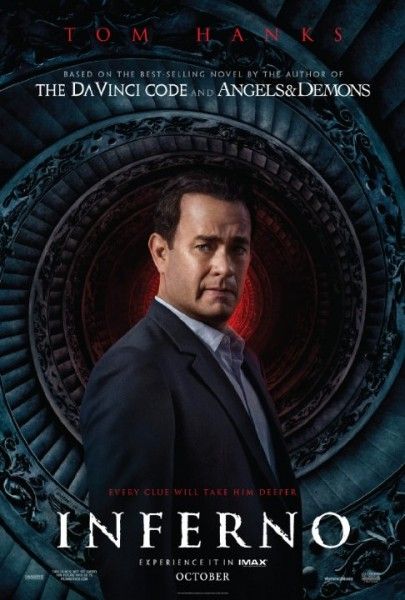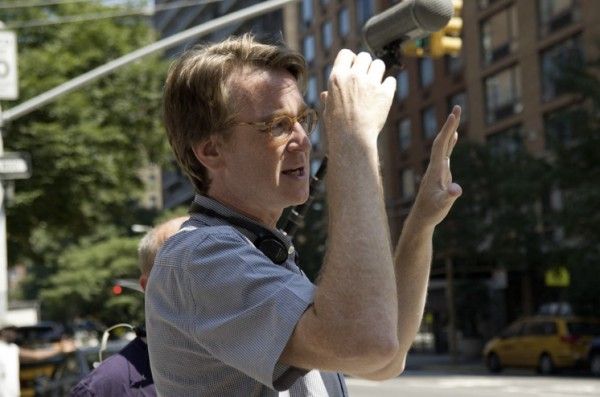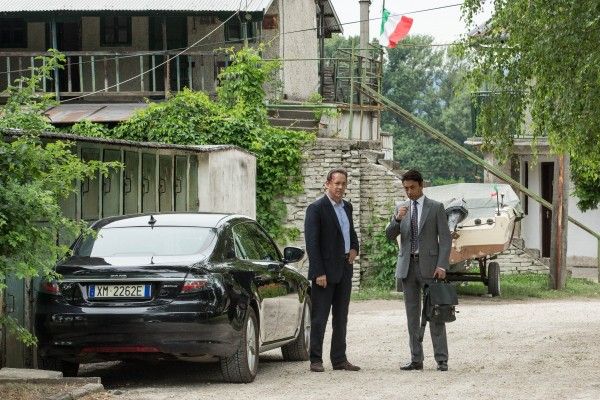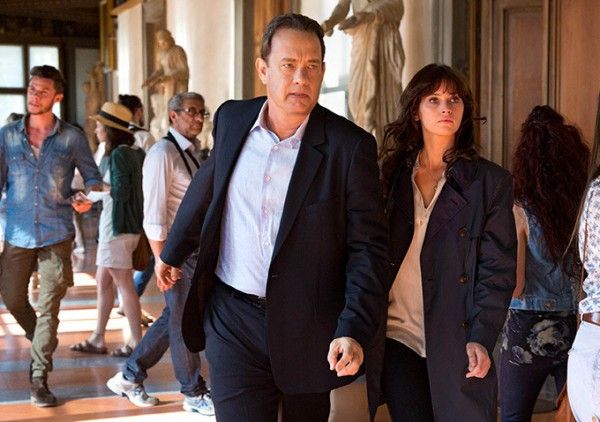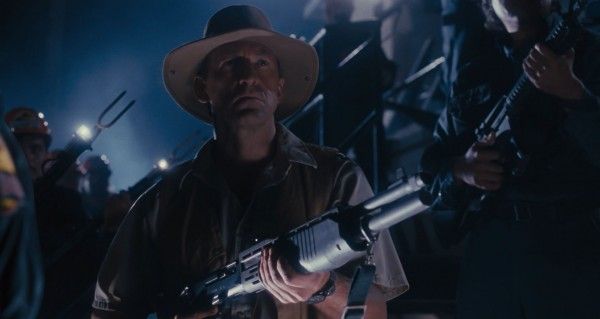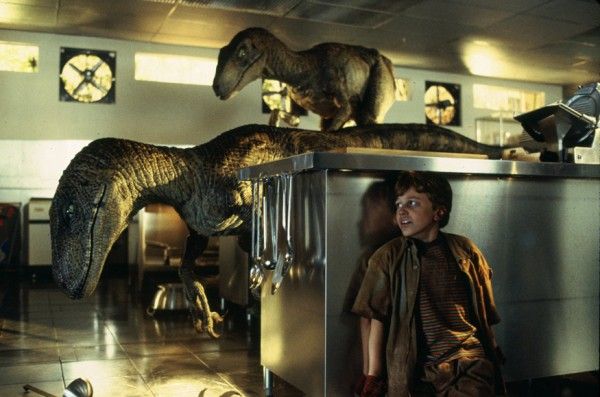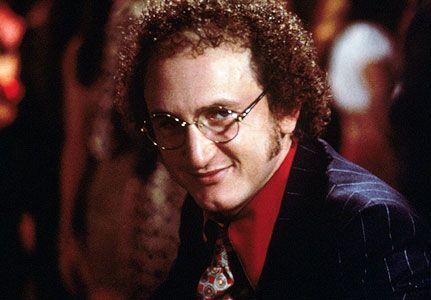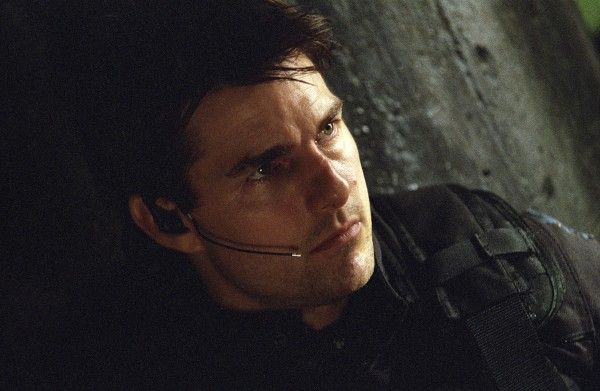One of the best things about doing an interview outside of a press junket is time. When a studio holds a big junket at a hotel, everyone’s time is extremely limited because the people need to be able to speak with all the reporters. While you occasionally can land twenty minutes with someone in a one-on-one setting, it’s not the norm.
So when I arranged to speak with veteran screenwriter David Koepp about writing the movie adaptation of Ron Howard’s Inferno, one of the things that really excited me was that he was going to give me enough time to have an in-depth conversation. We not only got to discuss the latest Robert Langdon adventure, but also his work on films such as David Fincher’s Panic Room, Steven Spielberg’s Jurassic Park, Brian De Palma's Carlito's Way, the first Mission: Impossible movie, and a lot more.
If you’re not familiar with Inferno, the film marks the third in the Robert Langdon franchise, following 2006’s The Da Vinci Code and 2009’s Angels & Demons, and finds Tom Hanks returning as the franchise’s hero. In Inferno, Dr. Langdon wakes up in an Italian hospital with amnesia and must team up with Dr. Sienna Brooks (Felicity Jones) to recover his memories and stop a madman from unleashing a plague inspired by Dante’s Inferno. Inferno also stars Irrfan Khan, Omar Sy, Ben Foster, and Sidse Babett Knudsen.
Check out what Koepp had to say below. If you missed what he told us about Indiana Jones 5 and his draft of Bride of Frankenstein, click the links.
Collider: So the first big question is: What do you get as an award when the worldwide box office for the movies you’ve been involved with pass $2 billion?
DAVID KOEPP: Well you get certificate good for working again in Hollywood. Whenever something does well I think, “OK, that buys me another 18 months” and when something does poorly I think, “I wondering if that eats into my 18 months?”
That’s really funny. You’ve been working in Hollywood as a screenwriter for a very long time, how has your process changed at all or do you still have a very typical routine?
KOEPP: I have a typical routine. I mean, you know, I think writing scripts for me hasn’t changed since my early twenties, which is...you know there’s thinking, research –Thinking is just like when you have an idea that’s just rattling around in your head for a year, or a week, or two years or whatever. Research, which can be extensive or not depending on the subject. Outlining, first draft, and perpetual rewrites. So that has not tended to change, the only thing that really changed was I used to work at night, and since I have kids I work in the day. Because you know kids force you into more of a regular schedule. But I think that still screenwriting, the best that tends to come from fewest people in the room and so that’s why I thought it would be nice to work with successful directors, because they tend to get the space that you need and you get a lot of other people in the room. I know that like the writers rooms is very popular in TV and certainly there’s a lot of per TV, like everyone else I watch a lot of TV these days but I don’t think the writers room approach has ever really worked for movies or maybe I’m just not good at it. I like the push and pull of two people talking, you know I try to go and seek out those situations although they’re harder and harder to find because of the way the movie business has changed.
Yeah, I agree with you. I don’t think when there’s ten screenwriters on a project you get a coherent vision.
KOEPP: Right, and not even like cooking up the story. I mean it’s not even just sequential stuff, sequential writers. I don’t have a lot of success when there’s three or four people trying to come up with a story and I’m supposed to go write it. I don’t do well in that situation.
Jumping into Inferno, the ending of the book is different than the ending of the movie. I’m curious, without going into the exact specifics, how that came about, that discussion of, “we’re gonna make some changes.”
KOEPP: I think that there’s ideas that you can work out in book… I don’t know how to answer it exactly without falling back into the cliché that, “well books and movies are very different.” But they are and there’s ideas –I ideas and people’s thoughts can work great in a book but you have no access to them really in a movie. And I think the ending of the book which I found really cool, as a book was not something that I felt you could dramatize very well in terms of what people say and do, which is really all you have in a movie, what people say and do, what we see and hear. The book rested on an idea and some thought processes and having the opportunity to...well the book half the Earth is realized at the end. And that’s a cool idea, that’s a really cool idea and I enjoyed reading about it and he gets to spend a couple pages expounding on that idea, but unless I put that in some character’s mouth as a monologue that doesn’t give me much to dramatize. So it felt like we needed a different ending, which would suit the movie.
When you’re writing the screenplay, but you have an author like Dan Brown who is very popular and arguably pretty powerful with his stuff, how much are you guys talking back-and-forth and how much is it Dan just saying, “Hey the movie’s gonna be the movie and the book’s gonna be the book.”?
KOEPP: I think Dan says that –I don’t really communicate with Dan much if at all. We met several times and I like him and he’s been very encouraging and supportive of the movies and two of the scripts I’ve written for the movies. But I find that a novelist and a screenwriter don’t really, you know, we don’t have a lot to talk about. It was the same with Michael Crichton, I adapted two of his books without ever meeting him. I find that most of the communication going through the director is really the way to go because I can speak frankly about the problems I might be having changing the book and he can speak frankly about the problems he might have with the script without trying to navigate that with each other. If I wrote a book and some idiot screenwriter was adapting it I wouldn’t want to hear about it, because I would think everything they’re doing is wrong. So if somebody else adopts your child I don’t think you want to watch them raise them. I think the only time I spent a lot of time with an author of a book was Edwin Torres in Carlito's Way because it was really about his childhood and people he really knew and an experience that he really had. And I knew nothing about it so the sole source of my research was his wife who I did get to hang around some.
When you’re writing a script like Inferno or maybe any of your other scripts, how cognizant are you of writing with a budget in mind and how much are you, “I’m gonna write the script and I’m gonna let the director and the studio figure out how to pay for it.”?
KOEPP: You know, I used to worry about budget and then [Steven] Spielberg told me on one of things I was writing for him, “Don’t worry about that. There are no limits except your imagination.” So I really try not to think about it at all and I write what I want to see. The only thing I care about is what I want to see when I’m at the movie, and then I hope that other people want to see that too. Because they’ll tell you if something's a problem and you just think of another way to do it, but I think that you can’t self-sensor that way unless something’s ridiculous. But usually if you write a twelve page chase, that’s gonna be a budget problem and structurally also because that’s an awfully long chase, are you sure you want that there? So the demands of the story often takes care of budget problems themselves.
One of the things I really like about Inferno is that the antagonist... so many movies have a shitty antagonist and it’s very frustrating as a moviegoer, and one of the things I liked about Inferno is Ben Foster’s characters is playing someone trying to deal with real world problems, and maybe he’s going about it a little extreme, but it’s a conversation piece we should all be having. Can you talk about having a strong antagonist with a clear vision.
KOEPP: Well, the great thing is that about the character is that he’s got an excellent point and to me he’s the best kind of antagonist because he can articulate and defend his point, and you can even agree with him, and you can agree with him all the way up until the last part. He says there’s a terrible overpopulation problem, I agree with that. All of the woes that are plaguing humankind can be traced to human overpopulation, spread of disease, global warming, you know, the list goes on, I agree with all that. We need to do something to combat overpopulation, I totally agree with that. What we should do is wipe out half the planet and sterilize the other, “Wait a minute! I was with you for a long time there but you lost me on that last bit.” That’s where the madness or the sociopathic part of the bad guy comes in. But the good ones you don’t want them to have just a level of malevolent intent, the more defensible it is and the more sense it makes, the more formidable they are as a villain. For me the real challenge of this film was that he was dead from page 2, that makes it tricky.
I would agree with you on that. Talk a little bit about when you’re writing a script like Inferno, how much are you meeting with Tom [Hanks] and Ron [Howard] or the studio and sort of talking about knowing what you’re gonna do before doing it? How’s that process work at the beginning in terms of figuring out what you’re gonna do and how many people are involved in the kitchen?
KOEPP: There’s conversations at the very beginning with Ron [Howard] and the studio, Tom [Hanks] some although he wants you to try it and give him something to react to. It really is just conversations with Ron and the studio where you say what’s important to you, what might be tough to adapt or need changing from a book to a movie, the broad strokes of it all. Then I’ll start announcing what my problems are and someone will inevitably say, “Well, yeah that’s why we called you though.” That’s the lonely time, because it’s all your problem and you really have to give them something to react to. You know there’s some conversations, really extensive, they want to know. Generally, your intent is to preserve what they like and change what’s problematic. But after that you just have to go do it. Some entities like to see an outline, which I’m loathed to do. I’m happy to talk through an outline, but writing them up is terrible because I write an outline for myself but it’s not really a readable document. If you give it to somebody you can say this is an outline and it lacks character depth and humor and then inevitably they will call you and say, “I’m not feeling the characters deeply and it’s really not that funny.” and you’re like, “Yeah, well, it has none of the tools of a screenplay. I had only the boring bits.” So long answer, but the short version is: a couple extensive conversations, and then I gotta go try it.
You wrote Panic Room and I hear all the time about actors’ experiences working with David Fincher, in fact, I’m fascinated by it. But I don’t get to talk to too many screenwriters about working with him, so what was that process like, collaborating with him?
KOEPP: He was great. He was the greatest. He’s so protective of writers, it’s really lovely. I mean, he will push you –as he pushes anybody and as he pushes himself– to do better, but most directors do. What’s really touching is he takes –He doesn’t like people fucking with his writer at all, that’s his job. I remember we were at some meeting at the studio prior to shooting and they gave me some notes that I didn’t particularly like and I think I sort of made a face or something, and he excoriated the executive for giving me the note, he just really let him have it. And I thought, “Yeah! I’m not doing that note, that’s fucking stupid!” And then we left the meeting and we were walking down the hall and he said, “You know you really ought to think about that, it’s a really good point.” [Laughs.] And I was like, “Oh, I get it. You just don’t want them telling me what to do.”
Whatever happened to the Thin Man remake that you were writing for Johnny Depp and Rob Marshall?
KOEPP: I never wrote that. Sometimes you start a job and you work on it a couple of weeks, you write an outline, and I really liked it, they didn’t see it the way I did. Everybody’s better off if you immediately say, “Don’t give me any money until it’s done.” Because if you think, “Well, let me try it, we’ll agree on it later” then money changes hands and they all start screaming at each other. I backed out of that.
Another subject I wanted to talk to you about is Jurassic Park. When you were involved with the movie way back when, did you have any inkling that it would be monster hit?
KOEPP: No, no. In fact, the question was if it would work at all, because it was ’92 when it was made, ’93 when it came out, it was PG, and you didn’t know if it was gonna look like. And I remember there was one test that ILM did, I saw a screener one day and it was just the skeleton of a velociraptor running in place and there was no musculature or skin yet. But just looking at the skeleton running, there was such a fluidity and a reality to it that you got this chill and thought, “Oh, it might work.” But still, even during the making of it, you don’t know if it’s gonna work or not. You never know if any movie’s gonna work or not, but this one in particular, it was something that had never been tried. Then obviously one you start seeing what it looks like you’re like, “Oh, this is really gonna work. This looks great, I hope people go.” But during the making of it, no –We didn’t even know if it was gonna get made because if Steven hadn’t felt that the dinosaurs were gonna look good he wouldn’t have done it.
You mentioned earlier in our conversation that you didn’t work with Michael [Crichton], I was under the impression that you did work with Michael on the script and story. So you didn’t work with him at all?
KOEPP: He wrote a draft before I got there, and then one or two people tried and then I came in.
With Michael’s draft and whatever other people worked on, when you came in was it a page 1 rewrite?
KOEPP: Yeah.
Oh, it was.
KOEPP: Yeah I turned it over.
Was there anything in the Crichton draft –not to be disrespectful– that worked or was it just a different movie that he wanted to make?
KEOPP: It was a different movie. There were ideas –I didn’t read his until I had written my draft and there was gonna be an arbitration. But there were ideas –and this often happens– that Steven had wanted worked out. The carryover was the Steven’s ideas part. I think it’s really hard for a novelist to adapt their own book, which is what made Gone Girl even more impressive. You spend a couple of years with it, and a couple of years seeing it a certain way and you really have to be ruthless and take it apart and look at it from another angle yet preserve it. That’s just really, really hard to do.
When you were writing that script and working on that story, as you mentioned, technology back then was a completely different beast. So what was it like writing that not knowing if with what you were writing you could even film it?
KOEPP: That goes back to an earlier question you had about limits of budget. And I remember this was the first time I had that conversation. I wrote a line in one of my first drafts that said “The T-Rex bursts out of the trees, chases down the Gallimimus, and devours it in a cloud of dust and blood.” I thought, “Well I love that line, and I’d love to see that.” But I asked Steven, “This seems impossible to me, should I take it out? Should I do it another way? What are my limitations” and he said, “Your imagination, that’s the only limit you have. We’ll figure it out.” But I knew that the real challenge was running, in the movies if you see a dinosaur and his feet are in the shot it’s probably a puppet or one of Stan Winston’s creations. If you see the legs and it walks, that’s CG, but that’s what nobody knew if it would work or not. So much less running out of the foliage and eating another dinosaur in a wide shot.
I can’t even imagine trying to write that. A lot of people don’t realize that there were practical effects, CG, smoke and mirrors, that movie was made by pushing the boundaries of everything.
KOEPP: That and Terminator 2 were the sort of jazz singers of the CG era.
You’ve worked with Spielberg a number of times including now, has he changed at all as a collaborator over his career or is he still the guy that you were working with back on Jurassic Park?
KOEPP: That was about 23 years ago, so we’re both older. But, no, he’s the same guy in that the fun part is making them up, that’s the fun part. Rewrites I can take or leave, but the making it up part is the jazz. And what’s nice about Steven is he really views kicking around the story as the world is alive with possibility, rather than the way a lot of people view it as all so confusing and lame. There’s two kinds of collaborators, the ones that tell you everything doesn’t work and the ones who try to make stuff actually work. And he will run with almost any idea you throw out there, you may run with it a then both realize it’s not that difficult. He’s a very positive inventor, he’s a very constructive collaborator instead of a destructive one.
I have to ask, did you see Jurassic World, and what are your thoughts?
KOEPP: I did see it, and I thought it was hugely entertaining. I thought it was really fun.
I wanna jump into another project, you worked on Carlito’s Way right after Jurassic Park and you wanna talk about a back-to-back…
KOEPP: Yeah that was a pretty good year. I thought they’d all be like that.
Carlito’s Way, I don’t know what the reception was when it first came out, but it does seem like since its release the critical reception to the film has only gotten stronger and stronger. Have you noticed that?
KOEPP: Yeah there’s some that age and hold up nicely, and Carlito’s is one of them. I think that at the end of the ‘90s you got in cinema the best movies of the ‘90s, it was very nice. Because when it came out I think –Brian De Palma is about as savvy of a media observer that you’ll ever meet, then before it came out, before any critic had seen it, he said, “Well, I can tell you how it’s gonna go on this one. You wanna know?” I said, “Sure” and he said, “OK, Al [Pacino] sucks because he just won an Oscar and he’s played a gangster before. I suck because I did a gangster movie before, and this isn’t like it, but it’s enough like it. Sean [Penn] is fantastic because they haven’t seen him for a while and will like to have him back. That’s how it’s gonna go.” And that was exactly how it went. So it was a little disappointing that it wasn’t more warmly-received because I think it’s a really beautiful movie, but it went nicely over time.
What was it like working with De Palma on that, can you talk about that collaboration back then?
KOEPP: When he was predicting he also said, “Oh and the other thing is you suck because you’re ‘dinosaur boy’.” Brian was great, we did three movies together and it was great every time. I had a lot of laughs which and we’re close friends to this day. He’s a rather cynical man, but that’s what I love about him.
When you think back on Mission: Impossible, do you think back on it fondly or do you think back on just the arguments with all the people working on that screenplay?
KOEPP: The arguments and the conflicts fade in time, especially if the movie did well, so now I look back on it fondly, sure. If the movie had not done well, I think the memories would be less pleasant. You can look back on the arguments and the conflict now and find it all kind of confusing. But when you make a movie with people and in turns badly and it’s a flop, it’s weird, it covers your feelings about how the experience went, if it went well you start to remember it poorly, and then you run into the people you made it with and you act like you owe each other money. If it was a hit, even if you maybe had a lot of beefs while you were making it, you run into each other and it’s like, “Hey! It’s nice to see you!” So that’s superficial if that’s what it is.
I think that’s the way it is in real life with everybody. If something’s a success, you’re gonna just deal with ego. I know you’re working on Indy, but what other scripts are you currently working on, or are you just like a one-project-at-a-time person?
KOEPP: I do one at a time. What’s nice is if you –I have a couple of my own things, one or two things that I’m doodling in my down time. But I try to write on specs as much as I write adaptations or things that people ask me to do. And I think I’ve been pretty good at it, I wish it was 50-50 but it’s like 60-40 for things people ask me to do. The problem with specs is that sometimes they get in and sometimes they don’t, they vanish without a trace. But you always gotta have your own stuff going, you cannot stop, even though Hollywood has sort of turned away from original material a little bit, that’s no reason for you to stop.
I was gonna say it does seem like since I first moved to California, Hollywood was buying a lot more spec scripts, and it was just a different marketplace than it seems now. It’s so infrequent to hear studios buying specs.
KOEPP: I asked a studio executive recently and I said, “What’s with you guys and specs?” and he said, “I love specs! The problem is nobody writes them anymore” and he said, “What can we do to encourage people to write more specs?” and I said, “Buy some! That would really help. If people read about a couple of specs getting bought, I promise you most of the west side of L.A. will start freaking out.”
It’s true, but you do hear about certain people and certain specs selling for crazy money or a package being put together. But it’s not as frequent as it used to be.
KOEPP: No, it’s not.


